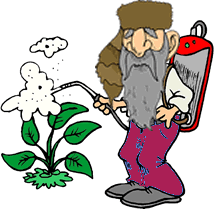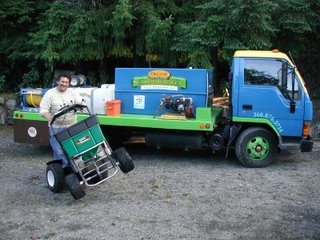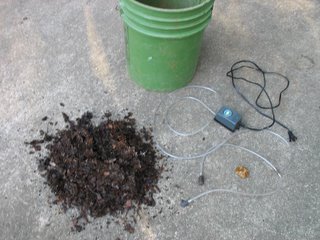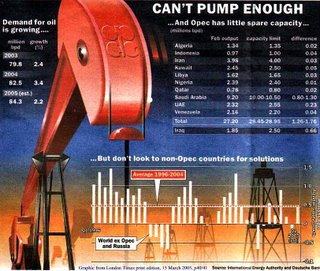
Please read the entire press release as a PDF here and the pass it along.
a journey of preparation


Republican Judd Gregg, chairman of the Senate Budget Committee said, "I believe it is time to take a serious look at reinstituting an excess profit tax on oil companies"
Democrats complaining about big business is nothing new but republicans calling for a tax increase? This must be serious. Both of these are examples of the ignorance of those in government. Don’t be fooled into thinking that the increase in the price of gasoline is a scam being put over on Americans by the big bad oil companies. You’ll look as silly as the idiots in
The price of crude oil has more than doubled in just over 2 years.
Gasoline prices here in

If the price of your raw materials doubled what would you do?
Perhaps the oil companies are working together to fix prices? Thomas Sowell reports that just isn’t the case.
“The Supreme Court's recent 8 to 0 decision (Justice Alito not yet participating) shot down a claim that oil companies were colluding in setting prices. That claim was upheld by the far-left 9th Circuit Court of Appeals but neither liberals nor conservatives on the Supreme Court were buying it.”
When’s the last time all of those folks agreed on something?
“Oil prices are up substantially since mid-February. …careful examination of recent supply data provided by the US Energy Information Agency (EIA) suggest… oil importers are bidding against each other for available total petroleum (crude oil + product) imports.
Since the week ending
This sharp decline in net
It turns out MSM reporters are either ignorant of the facts or lazily looking for an easy story. Just like our representatives in
The profits margins of big oil are inline with those of other
“Newspapers, part of the media that criticize oil profits, heavily outperformed Exxon in 2004. “The average 2004 operating margin of publicly owned newspapers… was 20.5 [percent],” the Los Angeles Times cited industry analyst John Morton in its
The Mail Tribune of Oregon reports more accurately on the state of profits in the oil sector, “The industry says among oil companies that have reported earnings this quarter, profit margins have averaged nearly 9 percent, which is just below the average across all U.S. companies that have reported results this quarter. Exxon Mobil had a profit margin of about 10 percent.”
Free Market Project says, “While Exxon’s profit is large in terms of absolute dollars, but so is the company. In 2005, profits for the world’s largest oil company were only 9.7 percent of its revenues, up from 9.6 percent of revenue in 2004, and far less than the 2004 Bank of America profit margin of 21.6 percent or Johnson and Johnson’s 18 percent, according to data from Forbes magazine.
Investorguide.com points to more big winners. “The net profit margin of the pharmaceutical drug manufacturing industry is 16.9%. For example, Merck and Pfizer have net profit margins of 20.4% and 15.5%, respectively.”
"The money center banking industry, which includes Wachovia, CitiGroup and Banc ofWhat was the profit margin for Exxon in 2005 again? Answer 9.6%. And the average among companies in the oil industry reporting for the first quarter of 2006? Answer, “net profit margins are 9.1%.”
Listen, I don’t like big oil. I think history will prove them and their industry as one of the most wasteful and destructive associations in human history. And I certainly don’t suggest trusting everything they pronounce but hell, The Hershey Company has a better profit margin than Exxon. Trying to blame the rising cost of gasoline on gouging by Big Oil is silly and unfounded; not to mention it takes the spotlight off the coming crisis. Peak oil is arriving. Wake up to the reality and then help others do the same.

Start by determining the fuel efficiency of your vehicle. You can use this online guide. It will help you determine how many miles you can travel using one gallon of gas.
Next push your car the same number of miles you would be able to drive your car on one gallon of gas.
Lastly evaluate the amount of money you would be willing to pay for this service in the future.
There is an incredible amount of energy embodied in petroleum. Our ability to harness this easily extractable, easily transportable fuel has transformed our way of life. Along the way we’ve lost sight of just how precious this resource is. We’ve become accustom to purchasing an incredible amount of energy for an extremely low price. When this resource is available in evermore limited amounts how will we react? How should we respond as a society? These are the questions we should be asking ourselves as the planet peaks in oil production. Time spent grumbling won’t help.
Anyone who has ever gardened will tell you there is a constant need to replenish the nutrients depleted by crops and there is also a need to protect the harvest from bugs bent on eating your yield. What is an appropriate response to these issues in a post peak petroleum world? Compost tea of course.
The green revolution of the 1950’s and 60’s included advancements in the mechanization of farm labor, further developments in irrigation techniques, genetic modification of plants through modern hybridization AND the introduction of chemical fertilizers and pesticides produced from fossil fuels. The combination of these efforts increased agricultural yields and eventually led to the domination of commercial farming in our grocery stores and across the landscape of

Commercial pesticides on the other hand are made from petroleum. Again we’ve seen a steady increase in the price of pesticides. This is due in part to the fact that the price of petroleum has continued to increase(remember U.S. oil production peaked in 1971) but also because of growing pesticide resistance and other manmade troubles. It turns out that the use of Genetically Modified crops actually increases the use of pesticides. Sometimes I’m not sure whether Agrobizcorp is coming or going.
There are other ways to make nutrients available to your plants and to protect them from ravenous pests. In addition to using compost as a way to recycle organic material back into the soil you can also infuse it in water to create a wonderful mixture your plants will love.
Using compost tea to water plants or as a foliar spray provides an overall increase in plant health and plant growth. This is achieved first by reducing the shock associated with transplanting. Compost tea also promotes improvement in soil structure by increasing the number of favorable microorganisms in the soil community. These same microbes increase the availability of nutrients in the soil providing more food for the plants. They also lead to an increase in the capacity of the plant to absorb the nutrients as well as an improvement in the ability of that same soil to hold moisture. Evidence, albeit anecdotal shows a reduced need for water in excess of 50% when compost tea is applied on a regular basis. In addition to helping ward off pests by strengthen the plants themselves, the microorganisms in compost tea also help fight natural plant enemies by occupying plant surfaces and competing for nutrients often utilized in unhealthy soils by these same pests. All of these benefits mean better yields and reduced costs, not to mention a reduction in your dependency on fossil fuels. And the best part is it’s so easy. There are commercial systems for brewing large quantities. There are also enterprising individuals already brewing to sell.
 More power to them. For brewing your own though you’ll only need the following:
More power to them. For brewing your own though you’ll only need the following:

That's it! Here are some helpful hints to aid in your effort. Compost is obviously the critical ingredient. Do you compost? This would be a good time to start a pile if you don’t. If you don’t have a compost pile search for an old pile of rotting leaves. Purchasing compost is another short term solution.
The oxygenation of the water provided by the pump creates an environment in which aerobic bacteria can live. You can see the air bubbles rising to the surface in the photo above. Remember that aerobic bacteria are the good guys that smell nice and benefit your soil. Your compost tea should smell earthy if not sweet. If it smells rotten something has gone wrong. The most likely culprit is not enough air or too much time. The anaerobic bacteria that can’t stand oxygen are smelly and can contain pathogens. Don't use smelly compost tea.
As with any natural process the method needs adjusting based on your location and situation. Experimentation is as always the best instructor. I occasionally use less compost or sometimes put in more sugar, always testing out change. I have made a bad batch or two but if you stick to the basic directions above you should be able to brew your own compost tea relatively quickly and for almost no money. For those of you who are interested in a fossil fuel free way in which to feed and strength your plants homebrewed compost tea is great.
For more information visit:

This article is an excellent introduction to peak oil. If you’ve been looking for a brief summary of the issue from a mainstream media source to share with your friends and family here it is.
The Price of Our Addiciton
by Jane Bryant Quinn
This is my last political post for a while; really. After sharing this graph with you I'll return to the greater task at hand- fostering relocalization and a greater sense of community through a return to citizen participation in the responsibilities of life. I could not pass this up though.
Bamboo fencing, compost tea, and the start of a community garden are all coming up. Stay tuned.

I recently wrote post peak eats, a summation of my presentation at the Triangle Conference on Peak oil and Community Solutions last month. In it I described part of the Cuban response to the decline in available petroleum experienced in country when the
a generally excellent article but do you really believe that the Cuban infant mortality is better than the
In an effort to better speak to these issues I thought a separate post was in order.
I did not rely on the Cuban government for my facts concerning the infant mortality rate and the life expectancy experienced here and in
Americans spend $5,267 per capita on health care every year, almost two and half times the industrialized world’s median of $2,193; the extra spending comes to hundreds of billions of dollars a year. What does that extra spending buy us? Americans have fewer doctors per capita than most Western countries. We go to the doctor less than people in other Western countries. We get admitted to the hospital less frequently than people in other Western countries. We are less satisfied with our health care than our counterparts in other countries. American life expectancy is lower than the Western average. Childhood-immunization rates in the
Information on the state of Cuban health care can be found in an article that states, Since 1959, Cuba has invested heavily in health care and now has twice as many physicians per capita as the United States and health indicators on a par with those in the most developed nations - despite the U.S. embargo that severely reduces the availability of medications and medical technology. Read the entire story here in The New England Journal of Medicine or here from the University of Dayton Law School.
I find it interesting that people here in the
The
The
The president of the
In fact there were no weapons of mass destruction. At the end of October 2004 it was clear that there were no WMD’s and documentation showed that more than 1,100 United States Servicemen and Servicewomen had been killed in
 The following month the American people reelected the leader that made this mistake and sent these brave solider to his War on Terror. Never mind that there had been no terrorists in
The following month the American people reelected the leader that made this mistake and sent these brave solider to his War on Terror. Never mind that there had been no terrorists in
It seems to be more about semantics for us. Rename your actions, or your program or your operation or your war and we’ll support you. It helps to label it as patriotic and to color it in red, white and blue. Shhhhhhhhhhhh. The American people are sleeping.
It’s been widely reported that Fidel has killed or imprisoned political opponents during his leadership of
In 1492 Chistopher Columbus landed in Cuba and renamed its inhabitants Indians. Within a few years the Spanish had conquered the natives and established a feudal system. Disease and abuse killed much of the population initially and those who remained worked to strip the island of its resources to be shipped back to
History, History and More History.
If you’re still reading this you’re probably shocked and angry at either me or the
Human history will be shifting soon. A peak in global oil production and later in natural gas will cause energy availability to decrease. The ramifications will be felt throughout society and across the world. I believe the people of the
Chief among those are the importance of community and solidarity between the common people during times of crisis and the idea that in these same times of trouble the powers of government are willing and will probably be able to impose restrictions in opposition to the freedoms we currently enjoy. Those unwilling to learn new ways of being and doing and understanding our era will be in trouble. You can learn something from anything. Indeed in the future you must.
But I took it and I can’t complain; I’ve always been a coffee drinker and liquorish lover; subtlety sometimes unfamiliar and heaviness often at hand. I have fun. I am not a dull Jack but always with me there is a sense of uneasiness about that which those around me seem to regard as a harmless hungry polar bear that is “quite safe and of no concern to us… wait, is American Idol on tonight?”
But a life lived in despair or even one given over to the quiet desperation described by Thoreau is a sad way to spend an existence and luckily I am often reminded of this. The responsibility of living a deliberate, informed and responsible life must be balanced with a sense of humor and happiness even during the toughest of times.
Last night I had the pleasure of listening live to one of the most important storytellers of our time; Garrison Keillor. For those of you unfamiliar with this legendary radio personality he is the host of a weekly program called A Prairie Home Companion offered live for two hours each Saturday evening.
The show is a mix of the most talented musician from off the beaten path and a return to the on-air jokes, dramas and storytelling that more frequently characterized radio of the past at its best. It puts me at easy- good to listen to while fishing. His program is broadcast on 450 radio stations nationwide to an audience of over 3 million listeners. Howard Stern should be so lucky. The show is funny, self-deprecating and fairly even handed if slightly left of center. My Father-in-law was kind enough to buy me and my wife tickets to Garrison's one man show at Wingate University as a Christmas gift. I am grateful.
Garrison Kellior appeared after an introduction. He was there to tell us stories and to talk to us. The last thing I expected was for him to come on stage and ask us to sing but he did. He started our evening by saying we were all Americans and we were here tonight together and despite our divisive times or more appropriately because of them we should start the evening by singing our national anthem and he was right. I’m not sure "The Star-Spangled Banner” has ever given be goose bumps for so long- the whole song. My skin got tired.
Then we sang “
He talked and he sang and told stories that split my side. He spoke about or more accurately around the fact that we as a nation have placed ourselves in danger and have allowed ourselves to become soft and unaware of all that we have and how much it takes to maintain it. And I got the sense that he fully understands our crest of culture and our apex of empire and that this ship is unsustainable and is in need of a great turn. He did me and all of us there though a favor and offered a reprieve or more accurately an understanding of the historical insignificance of our crisis. He told us he was born on
 Will the spirit of community so long the fabric of our culture rise again as we struggle to adjust, adapt and remake a better way of life in the face of a necessary change or will we chose fear and blame and hate? Time will tell.
Will the spirit of community so long the fabric of our culture rise again as we struggle to adjust, adapt and remake a better way of life in the face of a necessary change or will we chose fear and blame and hate? Time will tell.
 I am delighted and thankful to have had the opportunity to spend the evening in community with such an unexpecting and delightful storyteller, apparently a spiritual benefactor as well. I appreciate the humor and grace with which he gave me hope that through times of trouble we might, as a people be willing to laugh aloud as we work together."Some luck lies in not getting what you thought you wanted but getting what you have, which once you have got it you may be smart enough to see is what you would have wanted had you known." - Garrison Keillor
I am delighted and thankful to have had the opportunity to spend the evening in community with such an unexpecting and delightful storyteller, apparently a spiritual benefactor as well. I appreciate the humor and grace with which he gave me hope that through times of trouble we might, as a people be willing to laugh aloud as we work together."Some luck lies in not getting what you thought you wanted but getting what you have, which once you have got it you may be smart enough to see is what you would have wanted had you known." - Garrison Keillor